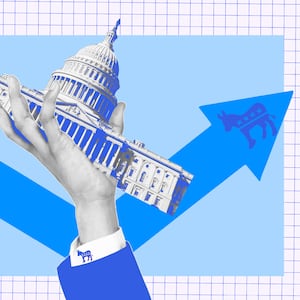So the Democrats have pushed open the door. The Senate passed—at 5:34 a.m. Friday, 51-50, strict party line—a budget resolution that clears the way to passage, probably next month, of Joe Biden’s COVID relief bill. It may not be exactly $1.9 trillion, but it looks like it’ll be something close to that.
First of all, please note: Working in harmony here were: President Biden; Bernie Sanders, who as chairman of the Senate Budget Committee was in charge of seeing this thing through; Joe Manchin and Krysten Sinema, who voted to move the resolution along; Vice President Kamala Harris, who cast the tie-breaking vote, and every other Senate Democrat, along with key figures from Biden’s economic team like Jared Bernstein and Heather Boushey. There were conflicts around the edges, about the minimum wage, but there may be room yet to work out a compromise. The point is, everyone was in the engine room shoveling coal together (I wonder why I chose a coal metaphor…).
But there’s a bigger historical point here. If the Democrats pass a one-point-whatever-trillion dollar stimulus package, the Republicans will freak. They’ll scream about the waste. They’ll scream about the deficit. They’ll scream about everything except what they’re really, truly afraid of: that it will work.
Ladies and gentlemen, meet the liberal today’s Republicans fear most. It isn’t Biden. It isn’t Sanders or Harris or AOC or Elizabeth Warren. In fact, this person isn’t even alive. He’s been dead for 75 years. It’s John Maynard Keynes. And despite what they say for public consumption, Republicans and right-wing elites live in mortal terror of a revival of Keynesian economic principles.
Republicans have a few basic assertions they make about the economy. One, that tax cuts always stimulate activity and pay for themselves. Two, that we should let the market find solutions to problems, and if problems persist, well, the market has decided in its wisdom that they deserve to persist, hence they’re not even really “problems” but simple facts of economic life (inequality, notably). And three, that government spending will almost always be wasteful and do more bad than good.
All three are lies. First, we’ve seen over and over and over again that tax cuts, especially for the rich, do not pay for themselves. They balloon the deficit. All. The. Time.
Have a gander, if you’re wonky enough, at this pdf. It’s a Treasury Department study of the revenue effects of every tax change from 1940 to 2013. And guess what it shows? It shows that when taxes were increased, revenues went up! And when they were decreased, revenues went down. The tax increases during World War II raised revenue, just as they were meant to. The Reagan and Bush tax cuts bled the treasury.
Yet Republicans still repeat this lie. They can’t possibly believe it anymore, deep down. Or maybe they do, who knows? But it’s a lie.
It’s also of course a lie that the free market can fix everything. The free market, in the form of unregulated banks betting against themselves, brought you the 2008 Great Recession. The free market was going to see the American auto industry obliterated. Et cetera.
But the most poisonous lie, and the most blatant, is the third. Keynesian public investment works. It worked in the mid-1930s, until FDR shifted course after being spooked by his era’s deficit hawks. It worked during the war. It worked for 30 years after the war (and then, admittedly, it hit a crisis, for a host of reasons). It worked in 2009-2010, the only problem being that the Obama stimulus was too small. It worked last year to prop up an economy that was in freefall.
And it’ll work this year. Putting cash in the hands of the non-rich will stimulate the economy; they’ll spend it. Unemployment benefits will keep people afloat who are out of work. Aid to small businesses will keep thousands of them from going under. Transportation aid will pay the salaries of airline workers who might otherwise be laid off. Aid to state and local governments will likewise keep thousands of people employed. This ain’t rocket science.
And Republicans know it. They’ve skated through with their phony economic arguments for a long time, nearly five decades now, for a lot of different reasons. First and most important, rich people like hearing that their taxes should be lower, so they put a lot of money behind the party and its candidates that keeps promising to cut them. Beyond that, lots of middle-class people like hearing that their taxes will be cut, too. And a lot of people have been persuaded that the market is awesome and the government is evil.
We’ve seen evidence that conservative economic policies fail. But what we haven’t yet seen, to the extent needed, is that liberal economic policies work. The Obama stimulus did all kinds of good things that no one knows about (except the people who read Michael Grunwald’s The New New Deal), but as I said above, it was too small to make a real positive, noticeable difference.
But the Biden bill is big enough to make a noticeable difference. And if—still a big if—we get enough people vaccinated and life gets back to something like normal by late summer, most economists think the economy will really start humming along, given all the millions of people who’ll be desperate to spend money and take vacations and go see Broadway plays and all the rest.
Right now, the economic left and right are locked in what we might call a paradigm struggle. Keynesianism held sway in this country for 40 years. Friedmanism (Milton) took over in the mid-1970s. Now, finally, its power is fading. It’ll be a long fight yet to bury it. Many liberal friends of mine sound to me too sanguine about the end of Friedmanism. But for the first time in my adult life, it’s possible.
And it’s Joe Biden leading the way. That scares Republicans, too; they know that a man who carries essentially zero ideological baggage is exactly the kind of person who can make the new economic case to middle America, especially at a moment when Republicans are taking on more baggage than John Jacob Astor on the Titanic. If Biden succeeds here, the Republicans are headed for an iceberg of their own.







